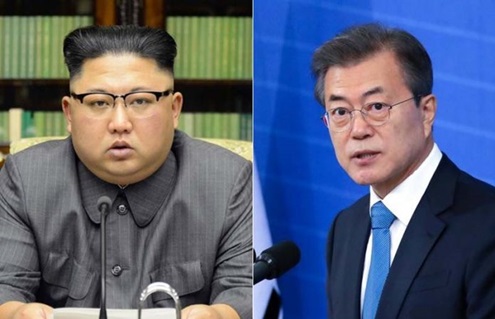With the upcoming North-South Korea summit drawing closer, the issue of formally ending the war between the two countries has become a topic of heavy interest. Accordingly, significant speculation surrounds the progress that will be made towards this end, with one of the major agenda items being peace on the Korean peninsula.
US President Donald Trump hosted a bilateral meeting with Japanese Prime Minister Shinzo Abe on April 17 at the Mar-a-Lago resort in Palm Beach, Florida. During the opening remarks of the meeting, Trump noted, “South Korea is planning a summit with North Korea to discuss the possibility for an end to the Korean War. I wish them lots of success. I wish them luck.” The statement served to show that the United States is in support of South Korea’s initiatives toward making a peace declaration to formally end the Korean War.
It is expected that talks for a peace declaration will be emphasized together with two other major topics planned for discussion, working toward permanent peace on the Korean peninsula and relaxing military tensions.
Cho Han Beom, a member of the research committee at the Korea Institute for National Unification, explained in an interview with Daily NK, “Unlike a peace treaty, a peace declaration is a political statement that can be achieved between the leaders of two countries. It sets a framework for stopping the arms race and establishing peace between South and North Korea.
Vice Director of the Asan Institute for Policy Studies Choi Kang stated, “Declaring an end to the war is just as it sounds. It’s a bilateral declaration between the leaders of both countries to stop the war and live peacefully. It’s a show of intent that neither country will enact confrontational policies towards one another.”
Vice Director Choi offered his opinion on the talks surrounding the issue of peace on the peninsula. “First, both countries found common ground with statements of political intent, and now it seems they are actively seeking a peace accord,” he said.
“Of course, North Korea giving up its nuclear weapons is set to be a prerequisite for any agreement that may take place, but for now just creating the foundation for de-escalating the situation on the Korean peninsula can be evaluated as a positive sign.”
Accordingly, if there is an announcement and concrete plans made to end the war at the North-South Korea summit on April 27, it is predicted that the US and China will push forward with a plan for a peace agreement between the two countries.
It is highly likely we will see steps towards establishing peace, such as a formal declaration to end the war, the signing of a non-aggression pact, limiting weapons development and discussing their disarmament, and the normalization of relations between the two Koreas.
In order to start down this path towards peace, we must first verify North Korea’s sincerity toward denuclearization, exact a commitment to disarm their existing nuclear facilities and weapons, and have it be preceded by specific, firm actions toward this goal.
On one hand, there is an opinion that it may be impossible to fully accomplish “Complete Verifiable Irreversible Destruction (CVID)” of an already nuclear-capable North Korea. For this reason, it has been noted that although the end of the Korean War may be declared by both sides, it might not achieve anything beyond symbolic significance.
Chun Young Woo, President of the Korean Peninsula Future Forum, noted, “The fact that the end of the war is set to be declared before denuclearization is accomplished can be seen as a statement that is far from the reality of the situation. As long as North Korea still has nuclear weapons, a war could break out at any time.”
If the Korean War is declared to be over at the summit, it is simply showing a desire to work towards a peace agreement. It does not in any way ensure the prevention of war or a solution to the security problem on the peninsula.
Vice Director Choi added, “One thing that is worrisome about declaring the end of the Korean War is that it may entice people into a false sense of security. Just this declaration by itself doesn’t have any power to prevent or deter a war from happening. Instead of treating this as a means to an end, we need to use it as an opportunity to create a clear proviso for peace.”
“In the future, we need to make sure that the impetus gained through these talks regarding security issues on the Korean peninsula remains strong and doesn’t lose its momentum,” he concluded.





















